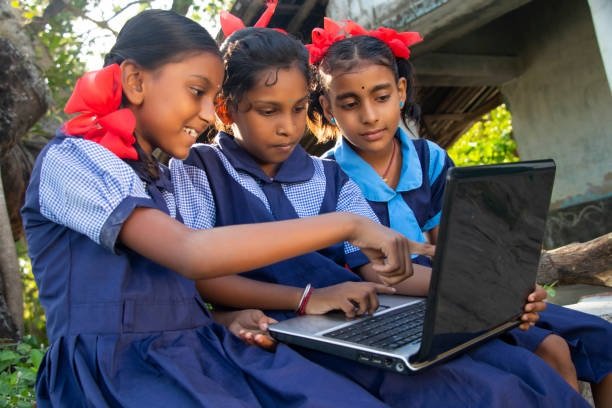In India’s bustling classrooms, the future teeters, bright yet brittle.
India’s low per capita income—one-sixth the global average—reflects its educational lag, says Satish Jha

By Satish Jha
I’ve spent recent months visiting schools, sitting with teachers, and hearing their raw fears about technology’s place in education.
Alarming Classroom Crisis
Their words hit hard: tablets sap students’ focus, they say. Screens might radiate harm. Social media lures children into forbidden corners, defying parents’ wishes. Students lean on Google instead of their own minds, copy-paste rather than write, and complain their hands tire holding pens. Some have forgotten how to write entirely. Others seek out content they shouldn’t.
These aren’t petty complaints—they’re alarms from a system on the verge of collapse.
In a rural school, chalk dust clouded the air as a teacher described a student who couldn’t spell simple words but swiped through apps with ease. Another recounted parents storming in, outraged over their child’s tablet addiction. These stories aren’t anomalies; they’re evidence of a deeper crisis.
Systemic Education Failure
India’s education system, meant to lift a billion dreams, is failing its students—and its future. The Annual Status of Education Reports (ASER) lay bare the truth: eighth graders often lack skills expected of second graders. This isn’t a minor gap; it’s a national emergency.
India has for long been standing at a crossroads. Its youthful population could fuel a demographic dividend, driving economic growth and global influence. But that promise rests on education—a system now sowing stagnation. Teachers, the architects of tomorrow, aren’t equipped to prepare students for an AI-driven, tech-fluent world.
The result is a nation lagging far behind, its per capita income one-sixth the global average. This economic lag mirrors an educational one, rooted in classrooms where outdated methods choke ambition and innovation.
Teachers Resisting Change
The teachers I met aren’t villains. They’re products of a culture resistant to change. Many see technology as a threat, not a tool. Their fears—distraction, health risks, overreliance on screens—reflect a deeper reluctance to evolve.
In one school, a teacher showed me a stack of handwritten essays, proud her students avoided computers. But pride in tradition won’t equip children for a future where digital fluency is as vital as literacy. India’s classrooms cling to rote learning, sidelining critical thinking and problem-solving—the skills a modern economy demands.
Contrast this with Finland, where teachers use technology to spark creativity, or Singapore, where AI personalizes learning. Indian students, tethered to pedagogies from another era, are left unprepared.
The gap isn’t just academic; it’s cultural. Teachers need a profound shift in mindset, seeing themselves as guides, not gatekeepers. Without this, India risks raising generations ill-equipped for a world that’s already moved on, leaving dreams of global leadership as mere fantasies.
Urgent Policy Reforms
The National Education Policy (NEP) of 2020 promised reform, but it’s a whisper when India needs a roar. Its nods to digital tools and teacher training are too timid, too slow. Incremental steps won’t close a chasm generations wide. Policy planners must act with boldness and urgency. A failing education system doesn’t just shortchange students; it undermines India’s economic growth, social mobility, and global standing.
The stakes are existential—education shapes the nation’s soul and its strength.
One bold idea could ignite change: send 2 to 3 percent of India’s teachers overseas every three months for cultural exchange. Let them work in schools in Canada, Australia, or Denmark, where technology empowers learning. In Copenhagen, I saw a teacher use a tablet to guide students through a virtual chemistry lab, their eyes alight with curiosity.
In Melbourne, AI tools tailored lessons to each child’s pace. Indian teachers, exposed to such practices, could confront their fears—radiation, distraction, loss of control—and see they’re not just educators but potential barriers to progress.
These teachers, returning home, could become catalysts. A single educator, inspired by global methods, could influence colleagues, principals, even districts. Imagine a teacher in Bihar sharing how Finnish schools blend coding with storytelling, or one in Uttar Pradesh demonstrating AI-driven assessments.
Reimagining India’s Future
This isn’t about copying the West—it’s about adapting proven strategies to India’s needs. A funded, scaled cultural exchange program could spark a grassroots shift, reshaping how India teaches, one classroom at a time.
But exposure alone won’t suffice. Policy planners must back this with structural reforms. First, mandate continuous teacher training in modern pedagogies. Workshops on AI tools, adaptive learning platforms, and digital literacy must be non-negotiable.
Modern Training Gaps
In a Delhi school, teachers admitted they’d never used software beyond email. That’s not a quirk—it’s a policy failure. Training must be practical, rigorous, and ongoing, turning teachers into tech-confident leaders, not reluctant bystanders.
Second, incentivize schools to adopt cutting-edge tools. Offer grants for AI platforms that personalize learning or tablets that support interactive curricula. In one school, I saw a pilot program where students used apps to solve math problems collaboratively, their excitement palpable.
Yet such initiatives are rare, scattered, and underfunded. Planners must scale these efforts, making technology a cornerstone of learning, not an afterthought. Every school, rural or urban, deserves access to tools that prepare students for the future.
Curriculum Overhaul Needed
Third, overhaul curricula to prioritize skills over facts. Rote memorization produces parrots, not innovators. Students need to code, analyze, and think critically. In Gujarat, a teacher told me her students memorized textbooks but struggled with basic problem-solving.
A curriculum that emphasizes inquiry—where students build apps, debate ideas, or design experiments—would unleash creativity. Policy planners must ensure every student learns to navigate a world where AI and technology are ubiquitous, not alien.
The cost of inaction is staggering. Education drives innovation, economic growth, and social progress. India’s low per capita income—one-sixth the global average—reflects its educational lag.
Bold Policy Vision
A nation that fails its students risks failing its future. The NEP’s gentle reforms, while well-intentioned, are like patching a sinking ship. Bold policies—teacher exchanges, mandatory training, tech incentives, and curricula overhaul—could transform schools into engines of progress.
This isn’t just about policy; it’s about vision. Picture classrooms where teachers wield technology to ignite curiosity, not fear it. Envision students coding as fluently as they write, solving problems instead of parroting answers.
India’s youth deserve an education system that doesn’t just catch up but leads. Policy planners hold the key: will they cling to cosmetic fixes or seize this moment to reimagine learning?
Future At Stake
The world moves relentlessly forward. India’s education system cannot afford to linger in the past. Planners, teachers, and politicians must unite to close the gap. The teachers’ fears I heard—about tablets, social media, and lost skills—are real, but they’re also a call to action.
India’s classrooms must become crucibles of innovation, not relics of tradition. The question is clear, and the time is now: will India rise to meet its future, or remain a cautionary tale?
About Satish Jha
Satish Jha, a distinguished figure in journalism, social entrepreneurship, and technology for development. He is truly a multidisciplinary leader—bridging the worlds of media, social entrepreneurship, technology, and policy with global insight and local impact.
Also Read
Ashraya chairman Satish Jha honored by Indo-American Art’s Council, New York – India CSR
Read more: Satish Jha
(India CSR)




















